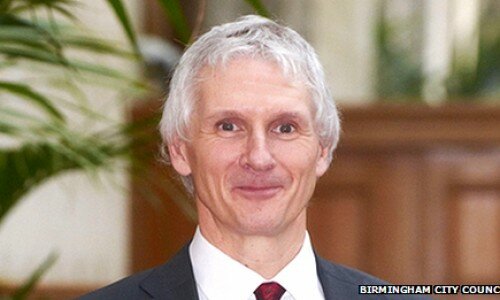
Rogers maps out lean (but not mean) future for council workforce
A Workforce Improvement Hub is being established to help Birmingham city council to develop more efficient ways of working.
The unit will provide learning and development support “to harness great ideas and innovation and bend them to delivering the council’s vision,” chief executive Mark Rogers has told staff.
The hub will have several elements – a change academy to provide learning and training in demand analysis and lean systems thinking, an innovation lab, an ideas exchange forum and an improvement team.
By far the most important aspect of this is Mr Rogers’s commitment to ‘lean systems thinking’ which he sees as the only way the council can hope to deliver decent public services against a backdrop of falling budgets and a dwindling workforce.
The council expects to have to cut about £200 million from its spending by 2020 on top of more than £500 million saved since 2010.
Just what is lean systems thinking?
Put crudely, it is a way of redesigning a workforce to eliminate waste and inflexibility, thereby improving production, or service delivery in the case of the public sector, while saving money at the same time.
Global management consultants McKinsey are the lean systems thinking gurus and have devoted thousands of words to the theory behind the concept.
The firm says the system can be used to replace ‘salami slicing’ local government cost-cutting programmes that aim to cut budgets by two or three per cent a year and end up not delivering the required savings and even weaken the quality of services.
According to McKinsey, crucially for the public sector, a lean approach breaks with the view that there has to be a trade-off between the quality of public services and the cost of providing them.
It is claimed that by improving an operating system —the configuration of assets, material resources, and staff—a lean approach can cut costs dramatically, typically by 15 to 30 per cent.
The first thing to disappear in Birmingham city council’s case will be the silo management approach that pitches department against department, and even sections of departments against each other, and makes flexible working practices impossible.
The McKinsey guide to lean systems thinking sets out the principles:
A lean process requires a performance-tracking system that breaks down top-level objectives into clear, measurable targets that workers at every level must understand, accept, and meet. When performance isn’t up to the standard, action is required.
Tackling problems quickly and holding colleagues accountable for poor performance raises efficiency as well as morale.
To mitigate the top-down nature of target setting, managers must often make changes themselves. In so doing, they should address the long-standing complaints of the frontline staff—complaints that typically include management’s lack of engagement, a greater desire for teamwork, and the need to tackle underperformance.
Invented, it is claimed, by the Toyota motor company in the 1950s, lean aims to optimise costs, quality, and customer service constantly. It does so by engaging and equipping employees to focus on creating and delivering value in the eyes of the customer and eliminating whatever doesn’t contribute to this goal.
The elimination of anything that does not contribute to the council’s overall goal can be translated into job losses, although McKinsey insists lean is about making a process or operation “fighting fit,” not about cutting it to the bone.
However, the jobs issue is not ducked in McKinsey’s clarion call for change:
Lean requires more than the courage to uncover deep-seated organizational problems; it may call for the ability to deal with job losses as well.
Without ducking this simple truth, politicians and public-sector leaders must outline the need for change, explaining its benefits and the logic of the planned approach.
They need to tell all stakeholders, including civil servants and the public, a compelling story about the impact and long-term benefits of change. The challenge to do more with less will not go away. A lean approach, with its emphasis on lower costs but higher quality and customer service, is surely worth investigating.
Mr Rogers says in his blog his long term ambition is to create an organisation “that has a shared purpose, values and supporting behaviours, thereby creating a culture in which making a positive difference every day to people’s live is the start, middle and end of all that we come to work to do”.
Similar Articles
Don’t go weak on metro mayors, think tank boss warns Government 7
The slightest weakening in the Government’s resolve to create a network of metro mayors across
Equalities boss Mushuq Ally to leave Birmingham city council 5
Birmingham city council’s assistant director for equalities, community safety and cohesion, Dr Mushuq Ally, is
UK interest rates cut as post-Brexit growth forecasts plummet 2
The impact of Brexit on the UK economy became clearer today when the Bank of
Dead hand of council bureaucracy ‘will turn metro mayor into toothless tiger’ 8
The West Midlands first elected metro mayor will have wholly inadequate powers and is likely
Syrians sent to league-topping Coventry 1
Chris Game, from the University of Birmingham, considers this week's report from the Home Affairs










